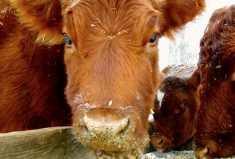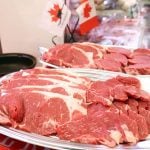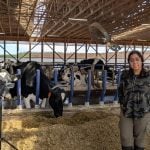Western Canadian feeder cattle prices traded $5 lower to $5 higher relative to week-ago levels. The market was quite variable across the Prairies, with eastern markets coming under more pressure comparable to southern Alberta. Feedlot operators and backgrounding farmers that were holding back on purchases earlier in the fall were stepping forward more aggressively this week.
At the same time, sales volumes remain near seasonal highs and a resumption of sales activity in Manitoba and eastern Saskatchewan was met with subdued buying interest.
Commercial feeders were noted scale-down buyers on limited volumes setting the price structure; buyer comments suggested the market remained vulnerable on very soft footing. We saw mixed steers weighing 570 lbs. average $258 in central Alberta, while larger-frame lower-flesh 600-lb. steers traded up to $260 in south-central Saskatchewan.
Read Also

China to buy 12 million metric tons of soybeans this season, Bessent says
U.S. Treasury Secretary Scott Bessent said on Thursday that China has agreed to buy 12 million metric tons of American soybeans during the current season through January and has committed to buying 25 million tons annually for the next three years as part of a larger trade agreement with Beijing.
Southern Alberta was the bright spot, where prices were $5-$7 above week-ago levels on higher-quality calves. Feedlot operators from Feedlot Alley were willing to pay up on cattle from known ranches and focused on performance efficiency. There was also growing buying interest from the cattle-feeding investor this week, averaging down on higher purchases earlier in fall. Tax year-related buying was a noted feature keeping markets supported in the major feeding regions.
Alberta packers were buying fed cattle in the range of $160-$163; however, the price-negative U.S. cold storage report resulted in weaker wholesale beef prices. U.S. choice wholesale beef closed the week at US$203/cwt, compared to US$206/cwt last week and year-ago levels of US$256/cwt. Year-to-date feeder cattle exports to the U.S. are now running 28 per cent behind last year while slaughter steers and heifer exports are down 48 per cent. The weaker Canadian dollar has little effect in the declining market south of the border.
Feeder cattle prices appear to have stabilized near 52-week lows for the time being; however, it is difficult to justify current values relative to the June live cattle futures. The feeder complex may hold value for the time being but I’m expecting further weakness in January and February.
— Jerry Klassen is manager of the Canadian office for Swiss-based grain trader GAP SA Grains and Produits. He is also president and founder of Resilient Capital, which specializes in proprietary commodity futures trading and commodity market analysis. Jerry owns farmland in Manitoba and Saskatchewan but grew up on a mixed farm/feedlot operation in southern Alberta, which keeps him close to the grassroots level of grain and cattle production. Jerry is a graduate of the University of Alberta. He can be reached at 204-504-8339.













